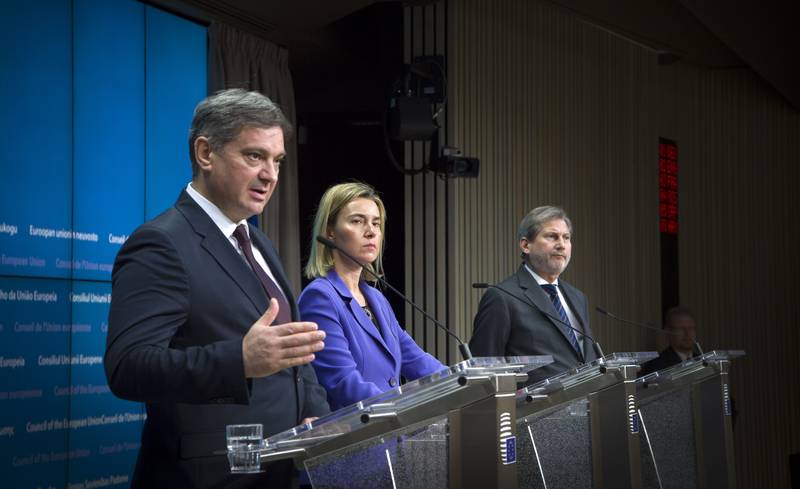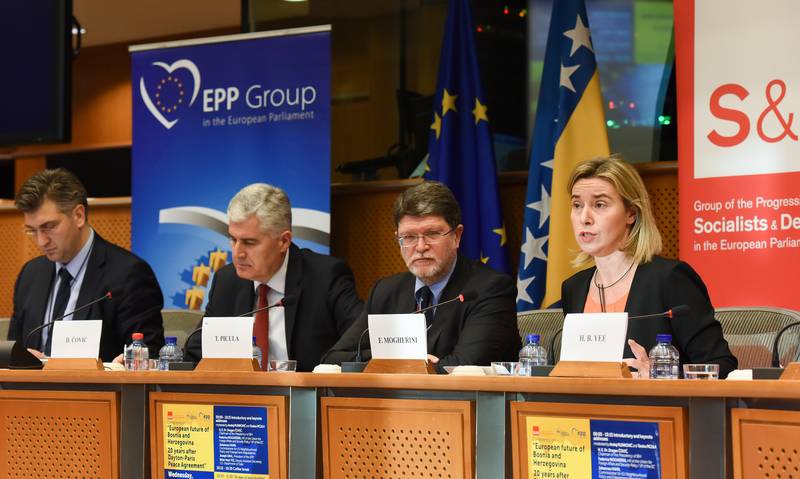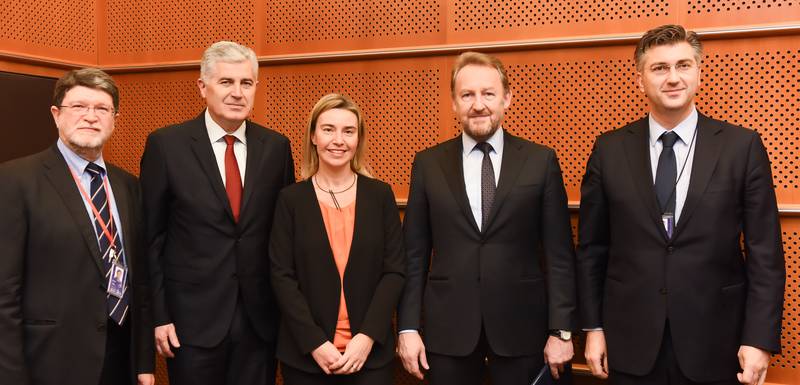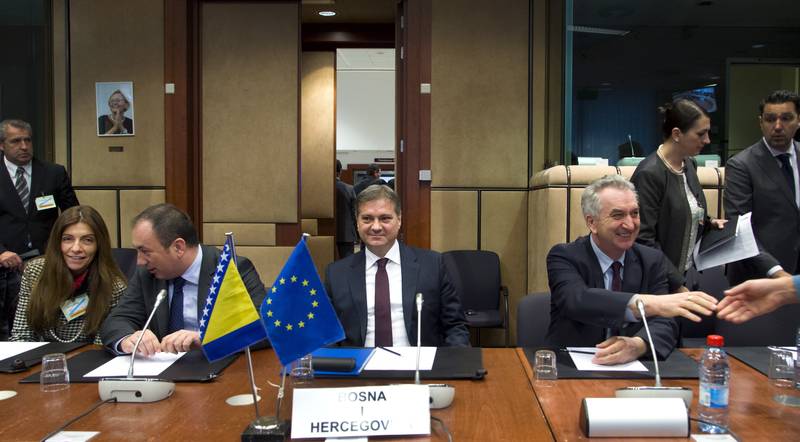Bosnia and Herzegovina Is Back on EU Path, but with Heavy Headwinds
Adelina Marini, December 15, 2015
 After wasting an entire decade, Bosnia and Herzegovina is finally back on the European path, not thanks to local politicians, nor European politicians and institutions, but to the country’s people, who revolted against the lack of progress and the irreversible process of impoverishment and distancing from the European horizon. Facing the danger of opening up of new problems in the Balkans the European Union got startled and geared up all its might in order to pull Bosnia and Herzegovina back from the brink of the abyss. Now the country is in the European spotlight. On December 11th, the first Stabilisation and Association Council between the EU and BiH was held, which became possible after the EU unfroze the Stabilisation and Association Agreement (SAA) and it came in force this summer as a reward for the efforts made by Bosnian politicians to agree on the reforms programme and the forming of a new government.
After wasting an entire decade, Bosnia and Herzegovina is finally back on the European path, not thanks to local politicians, nor European politicians and institutions, but to the country’s people, who revolted against the lack of progress and the irreversible process of impoverishment and distancing from the European horizon. Facing the danger of opening up of new problems in the Balkans the European Union got startled and geared up all its might in order to pull Bosnia and Herzegovina back from the brink of the abyss. Now the country is in the European spotlight. On December 11th, the first Stabilisation and Association Council between the EU and BiH was held, which became possible after the EU unfroze the Stabilisation and Association Agreement (SAA) and it came in force this summer as a reward for the efforts made by Bosnian politicians to agree on the reforms programme and the forming of a new government.
BiH Prime Minister Denis Zvizdić qualified December 11th as a historic date on the country’s path to European integration. This long-awaited step, however, was joined by another, which threatens the country’s stability. Republika Srpska announced that it is discontinuing the judicial cooperation with BiH’s General Prosecution Office, as well as with the Investigation Office. The High Representative of the European Union for Foreign Affairs and Security Policy Federica Mogherini (Italy, Socialists and Democrats) warned that this decision of the government of Republika Srpska could threaten the functioning of the judiciary and law enforcement in the country. “We underline the need to respect the rule of law throughout the whole territory of the country and we call the authorities in Bosnia and Herzegovina to maintain mutual cooperation and dialogue”, said Ms Mogherini at a joint conference with Zvizdić and Enlargement Negotiations Commissioner Johannes Hahn (Austria, EPP).
To touch Dayton, or not to touch it, this is the question
It took the EU a long time to realise that the creation of the international community, based on the Dayton peace agreement, cannot deal with its own internal strains alone. Over the last few months the striving of Republika Srpska to block unity in the state is one of the symptoms that nothing is over in BiH 20 years after the signing of the treaty in Paris. Ethnic Croats in the country are also actively lobbying for a re-negotiation of Dayton, so that a federal state of three equal peoples is created. They enjoy the support of many in Croatia, including President Kolinda Grabar-Kitarović and the Croat Democratic Union (HDZ), which is a member of the European People’s Party. The Bosnian Muslims (Bosniaks) are strongly opposed to any changes in the current structure.
The new challenges that BiH is facing became clear during the totally well timed and magnificently organised international conference, dedicated to the European path of BiH and the 20-year anniversary of the signing of the Dayton peace accord. The conference was organised in the European Parliament in Brussels by six Croatian MEPs, coming from three political groups in the EP – EPP, Socialists and Democrats, and ALDE. Part of the conference were Ms Mogherini, Mr Hahn, the Croat and Bosniak members of the joint presidency -- Dragan Čović and Bakir Izetbegović – MEPs, the High Representative of the international community for BiH Valentin Inzko, the head of the EU Delegation in the country, Lars-Gunnar Wigemark, analysts. The absence of the Serbian point of view, however, was noticeable. The Serbian member of the presidency of BiH, Mladen Ivanić, was supposed to take part in  the conference, but was absent due to health reasons.
the conference, but was absent due to health reasons.
All Croatian MEPs, regardless of their political colouring, were adamant that Dayton must be upgraded, for they believe the rights of Croats are not equal to those of Serbs and Bosniaks in the country. His theory of this effect was thoroughly presented by the Chairman of the Bosnian presidency, Dragan Čović, who feels that the Dayton peace agreement is based on the formula of two entities for three peoples, but the Croats have the least rights. He feels federalism is the only way of securing equal rights for the three peoples of the country. The Bosniak member of the presidency, Bakir Izetbegović, discounted this theory, saying that the Croats are much fewer as a number than their rights in the country suggest. Serbs are also disproportionately represented – they have many more people in the state’s structures than their population numbers suggest.
He added that aspirations for ethnic domination will not disappear soon and once more urged that no solutions are imposed on BiH from outside. The EU representatives, too, spoke against changes in the current organisation of the country. High Representative Federica Mogherini immediately parried the attempts to open Dayton. “We do not need to draw new dividing lines inside Europe, based on ethnicity, nationality or religion. Your history tells us how dangerous this can be. [...] Our culture, our European culture, is based on openness and not on segregation”, she said. Johannes Hahn in turn stated that Dayton and a clear European perspective are not opposite directions. “In other words: it is not either Dayton or the European Union. The European path is the natural further development, building on the stability and peace which was enabled thanks to the Dayton Peace Agreement”.
USA: the EU needs to be more involved
High Representative for BiH Valentin Inzko (Austria) pleaded to the state’s political elite to stop excusing the lack of progress with the Dayton accord. In his words, many politicians in the country are interested in keeping the status quo. American Deputy Assistant Secretary of State Brian Hoyt Yee is of the same opinion and went even further by saying that there are political parties in BiH, which are not working for Euro–Atlantic integration, but for their own means. He feels the reforms agenda should be far more ambitious. Even though he commended the EU for the effort, he criticised the Union for being modestly ambitious. We should not aim towards what is achievable, but rather what is necessary, he said.
The American representative warned that BiH and the EU are facing a very serious challenge – disintegration forces, which at the moment are far stronger than attraction ones. These forces, in his words, are terrorism, the migration crisis, corruption, and organised crime. The EU should be far more engaged in BiH, added Brian Hoyt Yee, giving an example of good European involvement the dialogue between Serbia and Kosovo, as well as the intervention in Macedonia. Something of this nature should be done in BiH, thinks the American representative. During the conference, former Croatian foreign minister Mate Granić, who participated in the negotiation of the Dayton peace agreement, urged the US to also have a more active role in the Balkans.
 American Vice-President Joe Biden came for an official visit to Croatia recently, invited by Croatian President Kolinda Grabar-Kitarović and the Slovenian head of state, Borut Pahor. He came to participate in the Brioni process, launched by the presidents of Croatia and Slovenia with the aim to strengthen integration of South-East Europe. This meeting marked the return of Washington to the region, although Biden himself denied that the US had ever left it at all.
American Vice-President Joe Biden came for an official visit to Croatia recently, invited by Croatian President Kolinda Grabar-Kitarović and the Slovenian head of state, Borut Pahor. He came to participate in the Brioni process, launched by the presidents of Croatia and Slovenia with the aim to strengthen integration of South-East Europe. This meeting marked the return of Washington to the region, although Biden himself denied that the US had ever left it at all.
Brian Hoyt Yee did not comment directly on the Dayton peace accord, but stated that institutional reforms should not be a taboo. European Parliament Committee on Foreign Affairs Chairman Elmar Brok (EPP, Germany) admitted that Dayton is a paradox, which brought peace and chaos at the same time. There were analysts present at the conference as well. The Chairman of the Austrian think-tank European Stability Initiative (ESI), Gerald Knaus, repeated his often stated position that the main culprit for BiH’s stagnation is the EU, which has so far been placing impossible requirements to the country. He urged that the EU be strict but fair to BiH and pull the country out of oblivion.
Architecture problems of BiH are spelt out in this year’s report of the European Commission on the state’s progress. It is noted in it that the Constitution had created a complex institutional construction, which remains ineffective and subject to different interpretations. It continues to violate the European convention on human rights regarding the European Court’s ruling on the Sejdić and Finci case, which BiH is yet to implement. It is noted that the country has a lot of work to do regarding human rights and the protection of minorities. There is much yet to be done regarding fighting corruption and organised crime as well. BiH has many economic problems. It has the highest youth unemployment rate in Europe – 62.7%. Total unemployment is also very high - 27.6%.
In order to continue forward on its European path BiH has to have considerable progress in the implementation of the reforms programme. The other condition is to adapt the Stabilisation and Association Agreement so that it includes Croatia’s accession in 2013, which has been blocked by BiH over the last two years. Johannes Hahn repeated clearly once more at the conference in Brussels last week that adaptation of the agreement is not a bilateral issue between BiH and Croatia. It is about relations between BiH and the EU as a whole.
The EU really needs to be more involved
It is fact that thanks to its strong commitment the EU managed to bring a considerable change in BiH. The first meeting of the BiH-EU Association Council is truly a historic step. It could, however, remain the only one for a long time to come if Brussels stops here. The words of Federica Mogherini during the conference last week that “In Dayton, the future of Bosnia and Herzegovina was shaped by the country’s leaders together with your neighbours and the international community. Twenty years after, the responsibility is yours and fully yours. You are accountable to your people” are alarming, for they show that the EU does not fully comprehend its responsibility in BiH and the Balkans in general in today’s geopolitical context. In the name of un-freezing of relations the EU has made a giant step forward towards Turkey in agreeing on holding regular summits with it twice a year in addition to numerous ministerial meetings and structured dialogues.
This needs to be the minimum programme for BiH, which is considerably more vulnerable than all other countries in the region because of its complex structure and the heavy geopolitical pressure that it is subjected to. Keeping in mind the virtually non-existent rule of law and smooth functioning of administration, BiH continues to need foreign aid, which PM Zvizdić asked for during the meeting on Friday. The EU can no longer remain a mere observer of the country’s efforts to fulfil both old and new requirements. It needs to actively participate and be noticeably present in BiH. It is a fact that the EU is subjected to strong disintegration forces, coming both from the outside and from within. Besides the ones outlined by the American Deputy Assistant Secretary of State, you could add euroscepticism, which is seriously  distracting the EU from one of its most common policies – enlargement - and also Russian propaganda in the region.
distracting the EU from one of its most common policies – enlargement - and also Russian propaganda in the region.
This is why dialogue with the main political players in the two entities and the Brčko District, as well as the role of the neighbouring countries need to be high up on the EU agenda, regardless of it already overflowing with other not less important issues.
Translated by Stanimir Stoev
 Bakir Izetbegovic, Andrej Plenkovic | © Council of the EU
Bakir Izetbegovic, Andrej Plenkovic | © Council of the EU Aleksandar Vucic, Recep Tayyip Erdogan | © Serbian Presidency
Aleksandar Vucic, Recep Tayyip Erdogan | © Serbian Presidency Jean-Claude Juncker, Zoran Zaev | © European Commission
Jean-Claude Juncker, Zoran Zaev | © European Commission